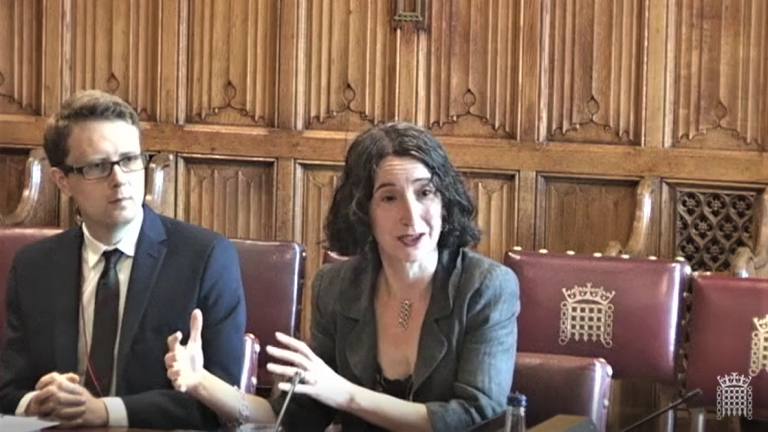Meg Russell gives evidence to Constitution Committee inquiry into the legislative process
7 June 2018

On 6 June, Constitution Unit Director Professor Meg Russell gave oral evidence - along with Daniel Gover (co-author of their book Legislation at Westminster) and Dr Ruth Fox (Director of the Hansard Society) - to the Constitution Committee's inquiry into the legislative process. In 2016, the four-stage inquiry was launched to follow up the Committee's 2004 report on Parliament and the Legislative Process. The Committee produced its first-stage report on preparing legislation in 2017, and is now taking evidence on the passage of legislation through parliament.
A video recording of the session (link below) is available on the parliament website, and some key points from Meg Russell's evidence are summarised below.
Drawing on findings from her book she argued that:
- Provoking 'anticipated reactions' is the most important yet least measurable power of parliament, and it operates at both formal and informal (including subconscious) levels. Parliament is always in the minds of ministers even before the formal legislative process begins.
- The importance of these reactions is evident in that governments prepare written 'handling strategies' in preparation for potential opposition they may encounter on each bill, in which they identify potential compromises and concessions they can offer.
- The effectiveness of the British parliament is boosted by the fact that the government has to respond to all amendments, questions, debates, etc., and thus ministers are held accountable. The public and open nature of parliament plays a crucial role in this.
- Ultimately, the more effective parliament gets, the more government gets better at anticipating and planning. Hence you cannot measure parliament's effectiveness solely through looking for conflict.
On the power of select committees, Professor Russell argued that:
- These committees are very well-respected, and can significantly influence the thinking of parliamentarians and ultimately, the government. Findings in her book showed that there were on average 140 references to select committees during debate on each bill. On many occasions, parliamentarians (including ministers) used select committee recommendations to justify their own positions.
- The UK is unusual, in sending bills in the House of Commons to temporary, non-specialist committees for their committee stage, rather than to permanent, expert committees as is the case in much of Europe and the US. But this does not mean that we should move to a system whereby the select committees handle the committee stage of bills. This could be damaging to the select committees, as it may make them more politicised; and their ability to have absolute control over their own agenda may be crowded out by having to respond to government proposals.
- However, that bills go to non-specialist temporary committees is a weakness of the system. Meg Russell referred to findings in a previous Constitution Unit report Fitting the Bill, which suggested that other ways of enhancing the degree of specialism and permanence of bill committees could be found.
On the contribution of the two chambers of parliament she argued that:
- Although the Commons and the Lords are different both culturally and procedurally, they operate effectively as a system, and the different select committees in the two chambers complement each other. Because the government has no majority in the Lords, it has to defend its policies on merit - this is good for the quality of legislation, and for scrutiny in both houses. Government will not put a bill before the Commons that it knows will get defeated by the Lords.
- However, with bills that start in the Lords, there may be a scrutiny gap because of the lack of public evidence sessions (such as those for Commons-starting bills). There could also be merit in taking evidence between bills coming from the Commons and arriving in the Lords to explore issues outstanding from the Commons stages.
Further details can be found in Meg Russell and Daniel Gover's written evidence to the Constitution Committee inquiry, in the video of the session, and in their book (see links below).
 Close
Close


